外研版必修1 Module 2 My New Teachers Grammar课件(37张ppt)
文档属性
| 名称 | 外研版必修1 Module 2 My New Teachers Grammar课件(37张ppt) | 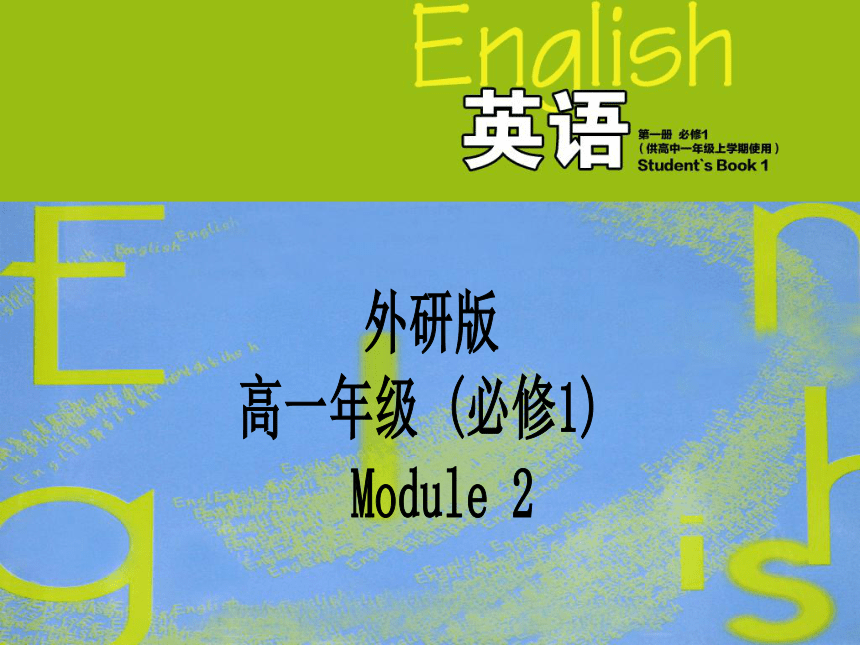 | |
| 格式 | zip | ||
| 文件大小 | 2.0MB | ||
| 资源类型 | 教案 | ||
| 版本资源 | 外研版 | ||
| 科目 | 英语 | ||
| 更新时间 | 2022-01-27 12:03:47 | ||
图片预览

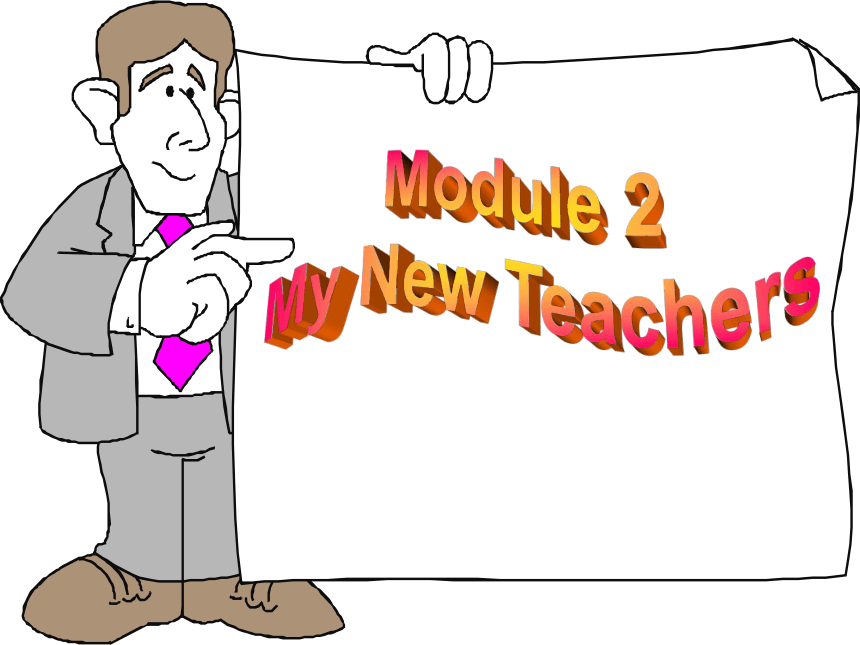
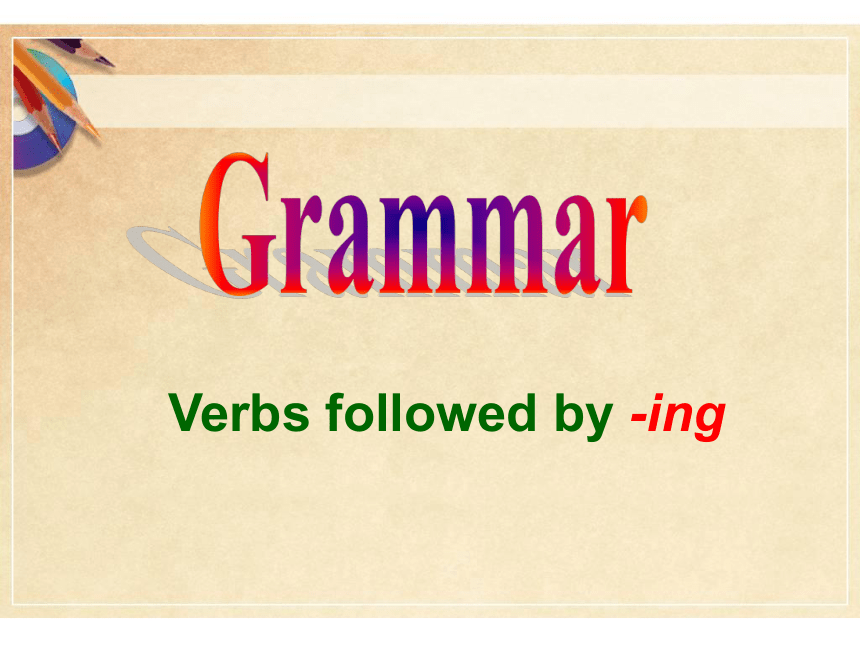
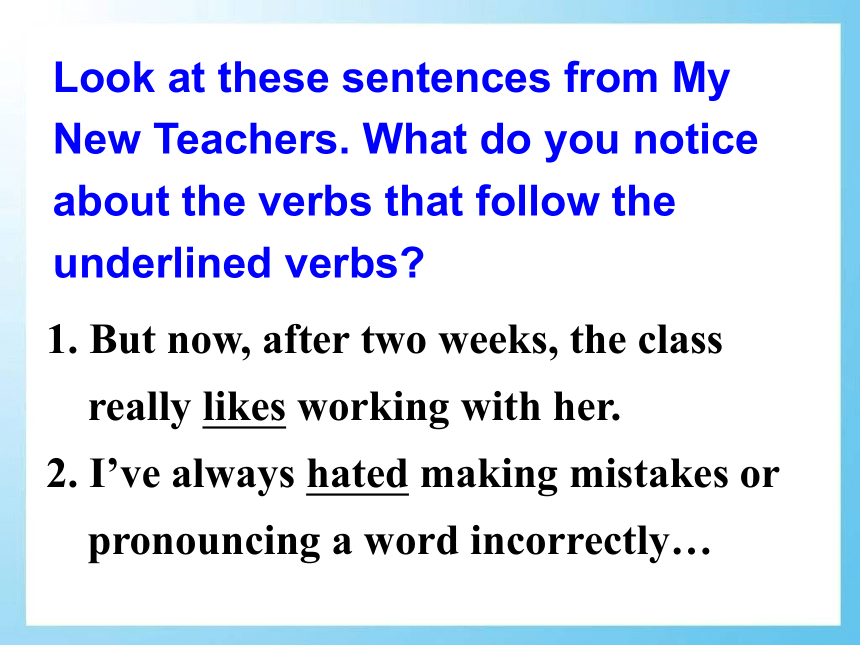
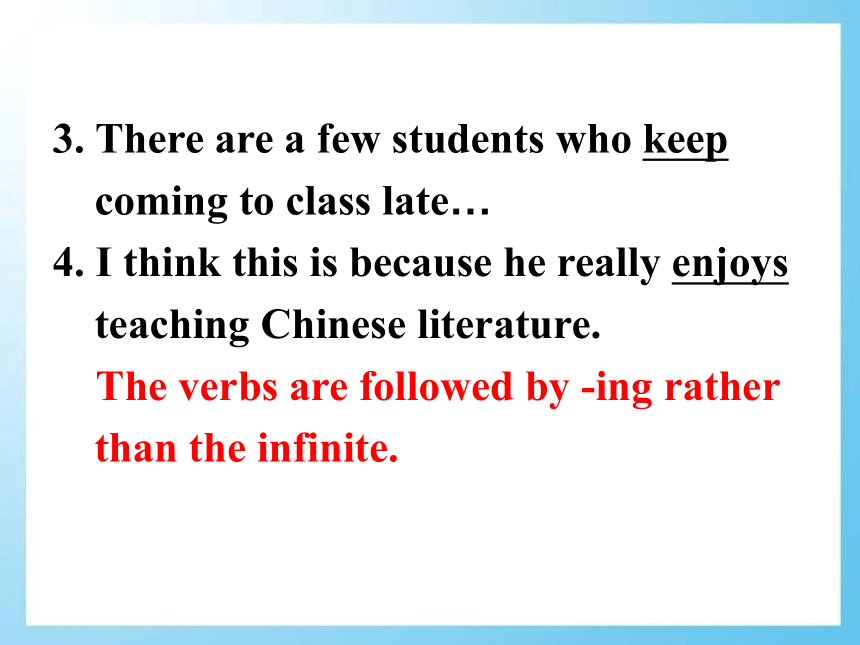
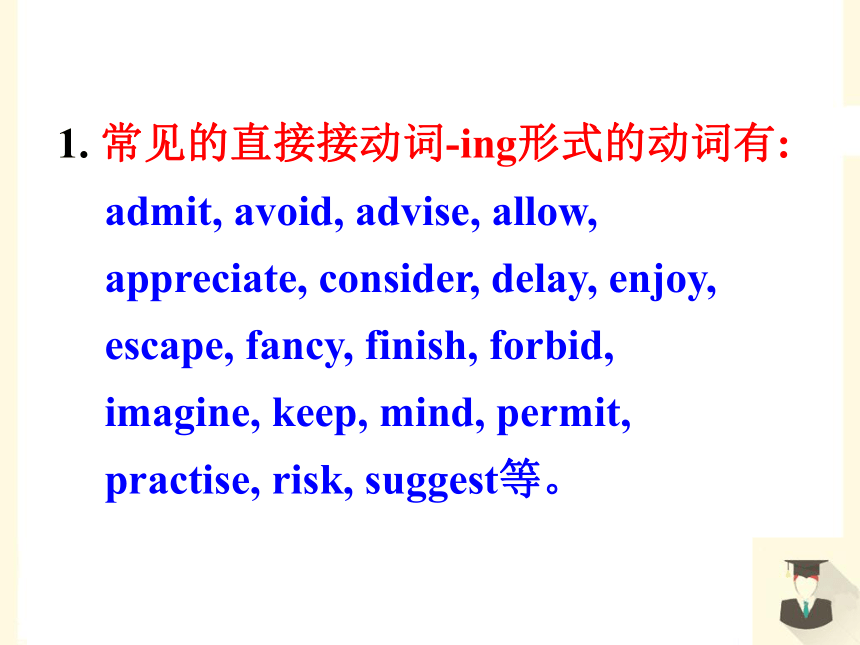
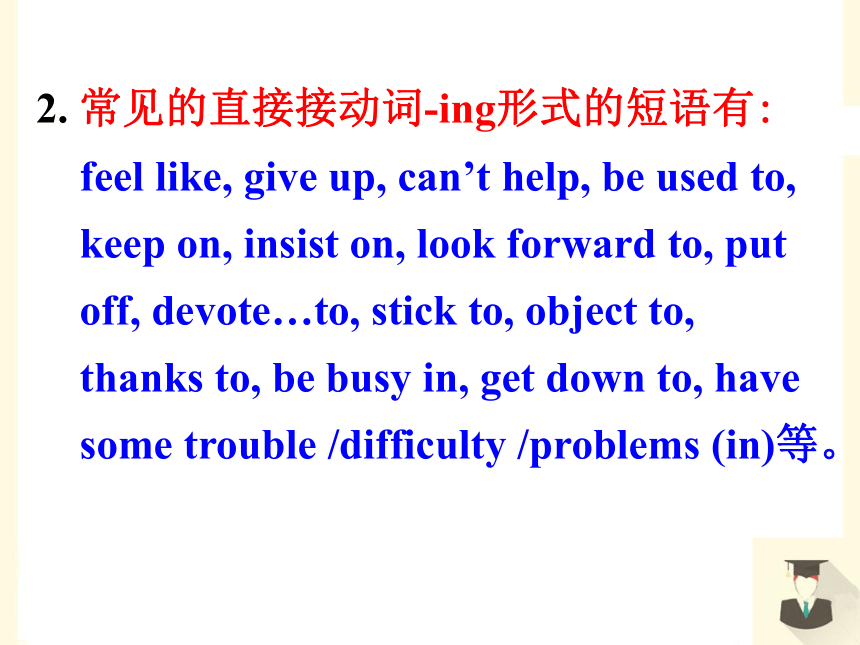
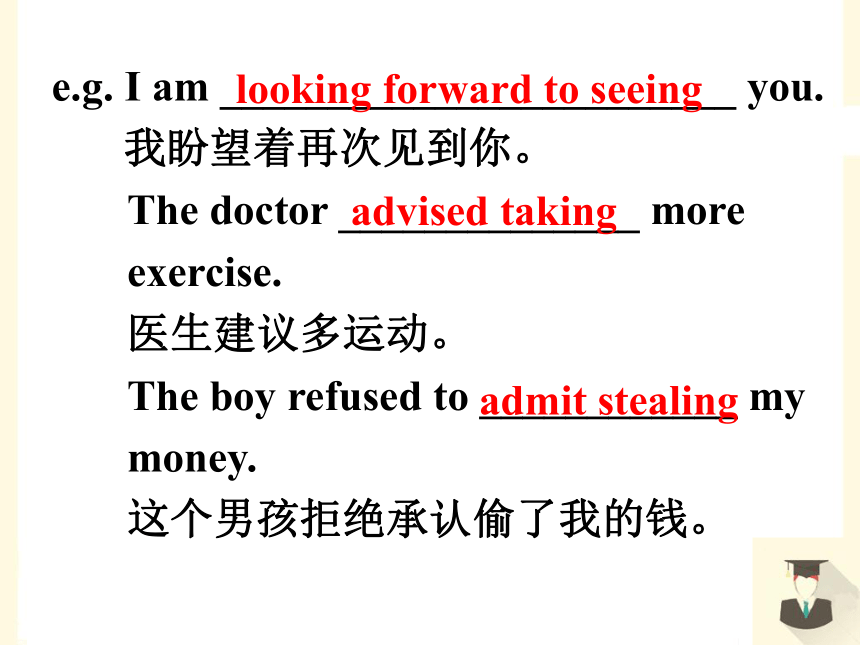
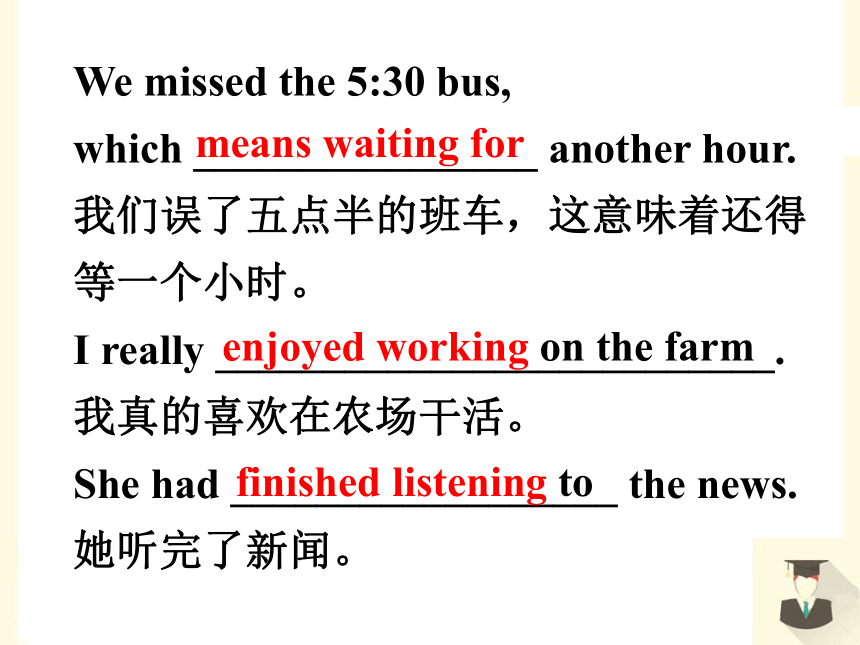
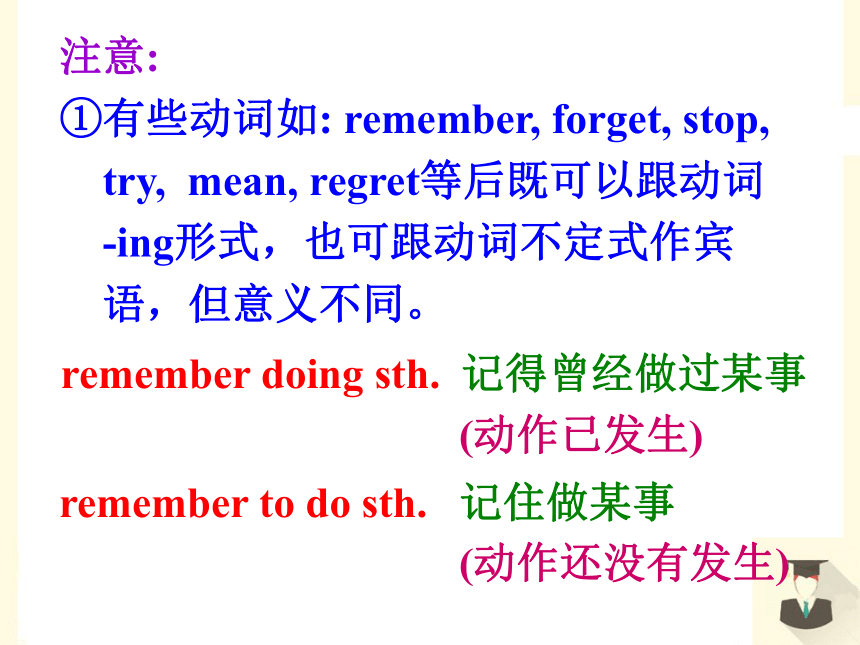
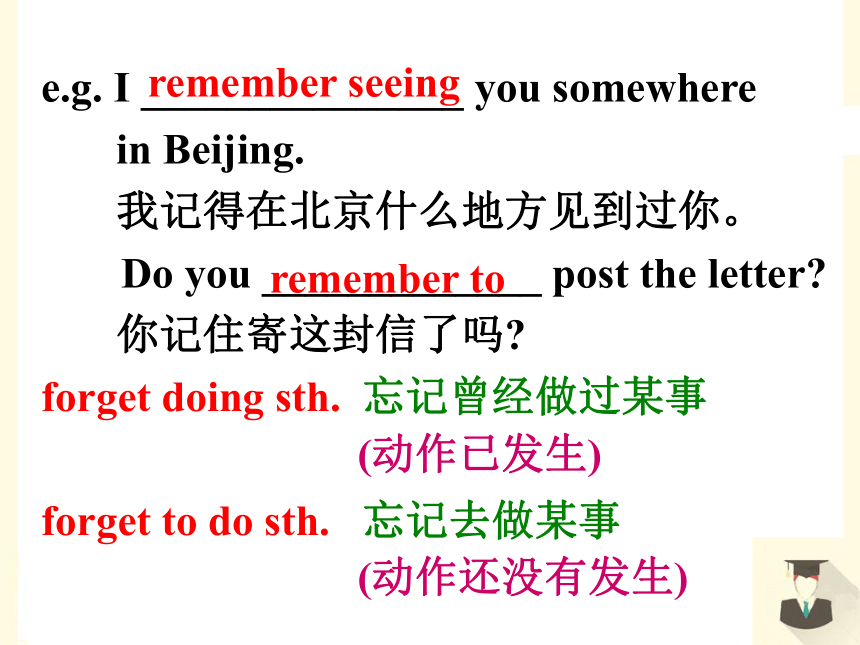
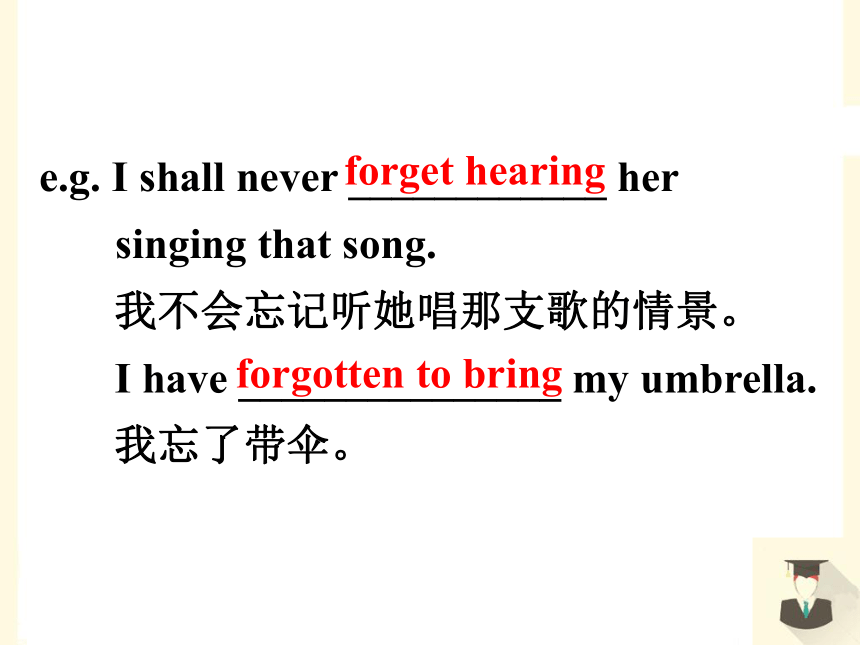
文档简介
(共38张PPT)
Verbs followed by -ing
1. But now, after two weeks, the class really likes working with her.
2. I’ve always hated making mistakes or pronouncing a word incorrectly…
Look at these sentences from My New Teachers. What do you notice about the verbs that follow the underlined verbs
3. There are a few students who keep coming to class late…
4. I think this is because he really enjoys teaching Chinese literature.
The verbs are followed by -ing rather than the infinite.
1. 常见的直接接动词-ing形式的动词有:
admit, avoid, advise, allow, appreciate, consider, delay, enjoy, escape, fancy, finish, forbid, imagine, keep, mind, permit, practise, risk, suggest等。
2. 常见的直接接动词-ing形式的短语有:
feel like, give up, can’t help, be used to,
keep on, insist on, look forward to, put off, devote…to, stick to, object to, thanks to, be busy in, get down to, have some trouble /difficulty /problems (in)等。
e.g. I am ________________________ you.
我盼望着再次见到你。
The doctor ______________ more
exercise.
医生建议多运动。
The boy refused to ____________ my
money.
这个男孩拒绝承认偷了我的钱。
looking forward to seeing
advised taking
admit stealing
We missed the 5:30 bus,
which ________________ another hour.
我们误了五点半的班车,这意味着还得等一个小时。
I really __________________________.
我真的喜欢在农场干活。
She had __________________ the news.
她听完了新闻。
means waiting for
enjoyed working on the farm
finished listening to
注意:
①有些动词如: remember, forget, stop,
try, mean, regret等后既可以跟动词
-ing形式,也可跟动词不定式作宾
语,但意义不同。
remember doing sth. 记得曾经做过某事
remember to do sth. 记住做某事
(动作已发生)
(动作还没有发生)
e.g. I _______________ you somewhere
in Beijing.
我记得在北京什么地方见到过你。
Do you _____________ post the letter
你记住寄这封信了吗
forget doing sth. 忘记曾经做过某事
forget to do sth. 忘记去做某事
(动作已发生)
(动作还没有发生)
remember seeing
remember to
e.g. I shall never ____________ her singing that song.
我不会忘记听她唱那支歌的情景。
I have _______________ my umbrella.
我忘了带伞。
forget hearing
forgotten to bring
stop doing 停止做某事 stop to do sth. 停下来去做某事
e.g. Please ____________ aloud.
请不要大声说话。
They ______________, but there was
no more sound.
他们停下来一听,但已经没有什么
声音了。
stop talking
stopped to listen
try doing 试着做某事
try to do sth. 尽力去做某事
e.g. Why not ________ it in some other way
为什么不用其他办法试一试呢?
I ____________ the problem but I
couldn’t.
我试图解答那个数学题,但我解不出。
“做做看”
“想要努力去做”之意,但实际上有没有做是另一回事。
try doing
tried to solve
mean to do sth 打算做某事
mean doing 意味着……
e.g. Missing the bus ________________ another hour.
赶不上那班巴士就要等一个小时。
I am sorry I hurt you, but I never
_________.
抱歉我伤害了你, 但我本来没有这个意思。
means waiting for
meant to
regret doing 对于……感到遗憾/后悔
regret to do sth. 因……感到遗憾
e.g. I _____________ him so much money.
He never paid me back.
我很后悔借给他那么多钱。他从来
没有还过我。
I ___________ you that you failed the
test.
我遗憾的告诉你你没有通过考试。
regret lending
regret to tell
② 动词like, love, prefer后接不定式或
动词-ing形式作宾语均可。但有一
些细微的差别。如表示经常性、
习惯性的动作常用动词-ing形式,
如表示特定情况或具体动作则常
用动词不定式。
e.g. I like listening to music of this kind.
I like to listen to this song.
They prefer going to the beach in summer.
They prefer to be alone now.
表示一般情况
表示一般情况
表示特定情况
表示特定情况
注意:
如果like, love, prefer前有would/should 时,后面则接动词不定式。
e.g. ________________________________
这个星期我想去游泳。
I ____________ meet your parents.
我想见你的父母。
I’d like to go swimming this weekend.
would love to
③ begin, start, continue后跟不定式和动
词-ing形式,通常没有差别。但在下列
三种情况下,其后需用动词不定式:
A. 当begin/start用于进行时时;
B. 当begin/start的主语是物时;
C. 当其后的动词为不可以用于进行时的
表示心理活动或精神状态的动词时。
e.g. I _________________________ it.
我开始记起这件事了。
The snow ____________.
雪开始融化。
He _________________.
他开始觉得害怕。
It _____________.
雨开始下了。
am beginning to remember
began to melt
began to feel afraid
started to rain
④ need表示“需要”, require表示
“求”, want表示“想要”时后面接
动词-ing形式或to be done结构。
e.g. The house wants/needs/requires
__________.
The house wants/needs/requires
_____________.
repairing
to be repaired
⑤ 有时动词-ing形式前面可有自己的
逻辑主语。
e.g. Would you mind my opening the
door
_________________
Would you ______________ next to
you
你不介意我坐你旁边吧?
我打开门你介意吗?
mind my sitting
1. In some parts of London, missing a bus
means ________ for another hour.
A. waiting B. to wait
C. wait D. to be waiting
2. The discovery of new evidence led to _______.
A. the thief having caught
B. catch the thief
C. the thief being caught
D. the thief to be caught
3. One learns a language by making
mistakes and ______ them.
A. correct B. correcting
C. corrects D. to correct
4. She meant _____ but the look on your
face suggested “No”.
A. explaining B. to explain
C. explanation D. to be explained
5. — When did you go to the States
— I remember _____ there when I was
ten.
A. having taken B. to be taken
C. being taken D. to take
用括号内单词的正确形式填空。
1. We are looking forward to ________ (have) another chance to try it again.
2. When I heard the joke, I couldn’t help ________ (laugh).
3. When she finished ________ (listen) to the news, Mrs Black turned off the radio.
having
laughing
listening
4. It’s impossible for us to avoid _______________ (influence) by the stormy weather.
5. I can’t imagine ________ (live) alone in a strange city.
6. I hate ________ (carry) a heavy bag when I am climbing a mountain.
being influenced
living
carrying
admit avoid consider dislike enjoy finish hate keep imagine like love practise stop suggest
Complete the sentences with words from the box. There may be more than one answer. Change the form where necessary.
1. The student ___________ copying from other students.
2. Please _________ talking.
3. Have you _______ checking your work It’s time to go home.
4. You need to _______ speaking in English to make progress.
5. He ______ asking stupid questions!
dislikes/hates
stop/keep
finished
practise
avoids
Fill in the blanks.
1. We were lucky to escape ________ (hit) by the car.
2. She always keeps _______ (put) off ______ (see) the dentist.
3. Sorry, we don’t allow ________ (smoke) here.
being hit
putting
smoking
seeing
4. All our classmates are considering _____ (go) to the city centre for the fashion show.
5. Can you imagine what difficulty we had ________ (reach) home in the storm
6. It’s time for me to get down to ________ (mark) the papers.
going
reaching
marking
7. I can’t stand _______________ (work) with Tom in the same office. He talks a lot while working.
8. —Remember ________ (return) the bat
to me.
—But I remember ________ (return) it
to you.
working / to work
to return
returning
Preview
Preview SPEAKING, LISTENING AND
VOCABULARY.
1. Do exercises 1-4 on page 73.
2. Write three more true sentences about yourself. Use the words in the box on page 14.
Verbs followed by -ing
1. But now, after two weeks, the class really likes working with her.
2. I’ve always hated making mistakes or pronouncing a word incorrectly…
Look at these sentences from My New Teachers. What do you notice about the verbs that follow the underlined verbs
3. There are a few students who keep coming to class late…
4. I think this is because he really enjoys teaching Chinese literature.
The verbs are followed by -ing rather than the infinite.
1. 常见的直接接动词-ing形式的动词有:
admit, avoid, advise, allow, appreciate, consider, delay, enjoy, escape, fancy, finish, forbid, imagine, keep, mind, permit, practise, risk, suggest等。
2. 常见的直接接动词-ing形式的短语有:
feel like, give up, can’t help, be used to,
keep on, insist on, look forward to, put off, devote…to, stick to, object to, thanks to, be busy in, get down to, have some trouble /difficulty /problems (in)等。
e.g. I am ________________________ you.
我盼望着再次见到你。
The doctor ______________ more
exercise.
医生建议多运动。
The boy refused to ____________ my
money.
这个男孩拒绝承认偷了我的钱。
looking forward to seeing
advised taking
admit stealing
We missed the 5:30 bus,
which ________________ another hour.
我们误了五点半的班车,这意味着还得等一个小时。
I really __________________________.
我真的喜欢在农场干活。
She had __________________ the news.
她听完了新闻。
means waiting for
enjoyed working on the farm
finished listening to
注意:
①有些动词如: remember, forget, stop,
try, mean, regret等后既可以跟动词
-ing形式,也可跟动词不定式作宾
语,但意义不同。
remember doing sth. 记得曾经做过某事
remember to do sth. 记住做某事
(动作已发生)
(动作还没有发生)
e.g. I _______________ you somewhere
in Beijing.
我记得在北京什么地方见到过你。
Do you _____________ post the letter
你记住寄这封信了吗
forget doing sth. 忘记曾经做过某事
forget to do sth. 忘记去做某事
(动作已发生)
(动作还没有发生)
remember seeing
remember to
e.g. I shall never ____________ her singing that song.
我不会忘记听她唱那支歌的情景。
I have _______________ my umbrella.
我忘了带伞。
forget hearing
forgotten to bring
stop doing 停止做某事 stop to do sth. 停下来去做某事
e.g. Please ____________ aloud.
请不要大声说话。
They ______________, but there was
no more sound.
他们停下来一听,但已经没有什么
声音了。
stop talking
stopped to listen
try doing 试着做某事
try to do sth. 尽力去做某事
e.g. Why not ________ it in some other way
为什么不用其他办法试一试呢?
I ____________ the problem but I
couldn’t.
我试图解答那个数学题,但我解不出。
“做做看”
“想要努力去做”之意,但实际上有没有做是另一回事。
try doing
tried to solve
mean to do sth 打算做某事
mean doing 意味着……
e.g. Missing the bus ________________ another hour.
赶不上那班巴士就要等一个小时。
I am sorry I hurt you, but I never
_________.
抱歉我伤害了你, 但我本来没有这个意思。
means waiting for
meant to
regret doing 对于……感到遗憾/后悔
regret to do sth. 因……感到遗憾
e.g. I _____________ him so much money.
He never paid me back.
我很后悔借给他那么多钱。他从来
没有还过我。
I ___________ you that you failed the
test.
我遗憾的告诉你你没有通过考试。
regret lending
regret to tell
② 动词like, love, prefer后接不定式或
动词-ing形式作宾语均可。但有一
些细微的差别。如表示经常性、
习惯性的动作常用动词-ing形式,
如表示特定情况或具体动作则常
用动词不定式。
e.g. I like listening to music of this kind.
I like to listen to this song.
They prefer going to the beach in summer.
They prefer to be alone now.
表示一般情况
表示一般情况
表示特定情况
表示特定情况
注意:
如果like, love, prefer前有would/should 时,后面则接动词不定式。
e.g. ________________________________
这个星期我想去游泳。
I ____________ meet your parents.
我想见你的父母。
I’d like to go swimming this weekend.
would love to
③ begin, start, continue后跟不定式和动
词-ing形式,通常没有差别。但在下列
三种情况下,其后需用动词不定式:
A. 当begin/start用于进行时时;
B. 当begin/start的主语是物时;
C. 当其后的动词为不可以用于进行时的
表示心理活动或精神状态的动词时。
e.g. I _________________________ it.
我开始记起这件事了。
The snow ____________.
雪开始融化。
He _________________.
他开始觉得害怕。
It _____________.
雨开始下了。
am beginning to remember
began to melt
began to feel afraid
started to rain
④ need表示“需要”, require表示
“求”, want表示“想要”时后面接
动词-ing形式或to be done结构。
e.g. The house wants/needs/requires
__________.
The house wants/needs/requires
_____________.
repairing
to be repaired
⑤ 有时动词-ing形式前面可有自己的
逻辑主语。
e.g. Would you mind my opening the
door
_________________
Would you ______________ next to
you
你不介意我坐你旁边吧?
我打开门你介意吗?
mind my sitting
1. In some parts of London, missing a bus
means ________ for another hour.
A. waiting B. to wait
C. wait D. to be waiting
2. The discovery of new evidence led to _______.
A. the thief having caught
B. catch the thief
C. the thief being caught
D. the thief to be caught
3. One learns a language by making
mistakes and ______ them.
A. correct B. correcting
C. corrects D. to correct
4. She meant _____ but the look on your
face suggested “No”.
A. explaining B. to explain
C. explanation D. to be explained
5. — When did you go to the States
— I remember _____ there when I was
ten.
A. having taken B. to be taken
C. being taken D. to take
用括号内单词的正确形式填空。
1. We are looking forward to ________ (have) another chance to try it again.
2. When I heard the joke, I couldn’t help ________ (laugh).
3. When she finished ________ (listen) to the news, Mrs Black turned off the radio.
having
laughing
listening
4. It’s impossible for us to avoid _______________ (influence) by the stormy weather.
5. I can’t imagine ________ (live) alone in a strange city.
6. I hate ________ (carry) a heavy bag when I am climbing a mountain.
being influenced
living
carrying
admit avoid consider dislike enjoy finish hate keep imagine like love practise stop suggest
Complete the sentences with words from the box. There may be more than one answer. Change the form where necessary.
1. The student ___________ copying from other students.
2. Please _________ talking.
3. Have you _______ checking your work It’s time to go home.
4. You need to _______ speaking in English to make progress.
5. He ______ asking stupid questions!
dislikes/hates
stop/keep
finished
practise
avoids
Fill in the blanks.
1. We were lucky to escape ________ (hit) by the car.
2. She always keeps _______ (put) off ______ (see) the dentist.
3. Sorry, we don’t allow ________ (smoke) here.
being hit
putting
smoking
seeing
4. All our classmates are considering _____ (go) to the city centre for the fashion show.
5. Can you imagine what difficulty we had ________ (reach) home in the storm
6. It’s time for me to get down to ________ (mark) the papers.
going
reaching
marking
7. I can’t stand _______________ (work) with Tom in the same office. He talks a lot while working.
8. —Remember ________ (return) the bat
to me.
—But I remember ________ (return) it
to you.
working / to work
to return
returning
Preview
Preview SPEAKING, LISTENING AND
VOCABULARY.
1. Do exercises 1-4 on page 73.
2. Write three more true sentences about yourself. Use the words in the box on page 14.
